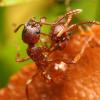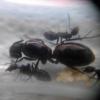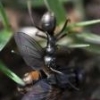- Formiculture.com
- Forums
- Gallery
- Members
- Member Map
- Chat

Myrmica rubra brood
Started By
iXvXi
, Jan 3 2017 11:29 AM
7 replies to this topic
#1
 Offline
-
Posted January 3 2017 - 11:29 AM
Offline
-
Posted January 3 2017 - 11:29 AM
My 4 queen Myrmica rubra colony still have brood this late in the year.
The problem is its taking forever to develop. Their nest is heated but their outworld isn't and it gets pretty cold at night. I was planning on waiting for them to finish as their first round of workers are slowly dying out.
I'm more worried about the health of the queens though. Assuming the brood will die off if I remove the heat, should I put them in hibernation now or wait? I haven't seen anything about myrmica rubra overwintering brood, is it possible?
The problem is its taking forever to develop. Their nest is heated but their outworld isn't and it gets pretty cold at night. I was planning on waiting for them to finish as their first round of workers are slowly dying out.
I'm more worried about the health of the queens though. Assuming the brood will die off if I remove the heat, should I put them in hibernation now or wait? I haven't seen anything about myrmica rubra overwintering brood, is it possible?
#2
 Offline
-
Posted January 3 2017 - 11:44 AM
Offline
-
Posted January 3 2017 - 11:44 AM
i've dug up myrmica at this time of the year before and they've had brood. and queens don't lay eggs if they won't survive hibernation.
#3
 Offline
-
Posted January 3 2017 - 12:05 PM
Offline
-
Posted January 3 2017 - 12:05 PM
i've dug up myrmica at this time of the year before and they've had brood. and queens don't lay eggs if they won't survive hibernation.
That last part definitely isn't true. Most temperate ants stop laying eggs around the time they hibernate and brood will development will slow or halt completely. These ants should have been in hibernation a while ago.
A lot of ants keep their brood through winter hibernation. There are notable exceptions, like Formica.
Edited by Batspiderfish, January 3 2017 - 12:06 PM.
If you've enjoyed using my expertise and identifications, please do not create undue ecological risk by releasing your ants. The environment which we keep our pet insects is alien and oftentimes unsanitary, so ensure that wild populations stay safe by giving your ants the best care you can manage for the rest of their lives, as we must do with any other pet.
Exotic ants are for those who think that vibrant diversity is something you need to pay money to see. It is illegal to transport live ants across state lines.
----
Black lives still matter.
#4
 Offline
-
Posted January 3 2017 - 12:17 PM
Offline
-
Posted January 3 2017 - 12:17 PM
I forgot to mention there is a new cluster of eggs..I'll go ahead and put them away though.
I was under then impression, they didn't keep brood through the winter but I have noticed they stopped development a while ago. Figured I'd get some opinions before I lower their temps.
Thanks
I was under then impression, they didn't keep brood through the winter but I have noticed they stopped development a while ago. Figured I'd get some opinions before I lower their temps.
Thanks
#5
 Offline
-
Posted January 3 2017 - 1:50 PM
Offline
-
Posted January 3 2017 - 1:50 PM
A lot of ants keep their brood through winter hibernation. There are notable exceptions, like Formica.
Could you please elaborate a little on this? First time ant keeper, managed to get a 3 queen Formica cinerea colony not too long ago. I haven't put them into hibernation because they are growing very quickly and progression hasn't halted. They're at around 40 workers and are still laying a healthy amount of eggs and their population will double soon as there is a lot of pupae and larvae in their nest. I am keeping them quite warm(27 degrees C in the warmest part of the nest) to boost brood development time. Is this harmful to do their first year, or should I try to hibernate them despite them not slowing down growth for hibernation?
#6
 Offline
-
Posted January 3 2017 - 2:12 PM
Offline
-
Posted January 3 2017 - 2:12 PM
A lot of ants keep their brood through winter hibernation. There are notable exceptions, like Formica.
Could you please elaborate a little on this? First time ant keeper, managed to get a 3 queen Formica cinerea colony not too long ago. I haven't put them into hibernation because they are growing very quickly and progression hasn't halted. They're at around 40 workers and are still laying a healthy amount of eggs and their population will double soon as there is a lot of pupae and larvae in their nest. I am keeping them quite warm(27 degrees C in the warmest part of the nest) to boost brood development time. Is this harmful to do their first year, or should I try to hibernate them despite them not slowing down growth for hibernation?
The heat is probably interfering with their biological clocks. Wild Formica do not keep brood over the winter. It is recommended to hibernate temperate ant species.
Also, "brood-boosting" refers to introducing brood from another colony in order to artificially boost the nest population, which is not suggested unless it is necesary for their founding strategy (i.e. temporary social parasites like Formica sanguinea and Formica rufa).
- LC3 likes this
If you've enjoyed using my expertise and identifications, please do not create undue ecological risk by releasing your ants. The environment which we keep our pet insects is alien and oftentimes unsanitary, so ensure that wild populations stay safe by giving your ants the best care you can manage for the rest of their lives, as we must do with any other pet.
Exotic ants are for those who think that vibrant diversity is something you need to pay money to see. It is illegal to transport live ants across state lines.
----
Black lives still matter.
#7
 Offline
-
Posted January 3 2017 - 2:24 PM
Offline
-
Posted January 3 2017 - 2:24 PM
I believe golit314 meant boosting the development as in adding heat.
I would taper off the heat like I'll be doing. Gradually until their movement slows and brood production halts. Since your brood is still developing, I'd do it slow, to get as much enclosed workers as possible.
I would taper off the heat like I'll be doing. Gradually until their movement slows and brood production halts. Since your brood is still developing, I'd do it slow, to get as much enclosed workers as possible.
#8
 Offline
-
Posted January 3 2017 - 5:50 PM
Offline
-
Posted January 3 2017 - 5:50 PM
I believe golit314 meant boosting the development as in adding heat.
Correct
0 user(s) are reading this topic
0 members, 0 guests, 0 anonymous users















